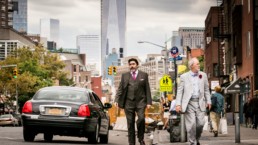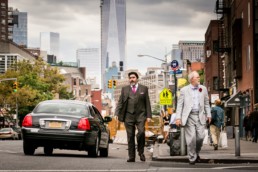Review: ‘Love Is Strange’
Its misleading title suggests that things would play strangely; the affect, however, is a strangely normal new-age love story in Queer cinema.
For a movie whose universally-commentating title would imply it to reveal unexpected and unusual events, arising from said declarative statement, this new-age love story sure is misleading.
In fact, writer/director Ira Sachs‘ latest effort, Love Is Strange, almost seems to take on the motivated spirit of championing how love, across all genders, is so not strange in this mildly droll outing. Though perhaps it is love’s surrounding societal factors that threaten it and relationships of all kinds, even in this twenty-first century, that Sachs is intending to tap into. For we not only see a story of how later-in-life homosexual partners are forced to confront the failings in both the institutions that they both live in as well as the bond between them, but also the same dealings faced by husbands and wives.
The setting is present day upscale New York, and in this first scene we see longtime partners, the more divaesque seventy-something Ben (John Lithgow) and more rationally-centered and more English George (Alfred Molina), getting ready for their wedding day, of which they’ve waited forty plus years until was finally legally recognized in the state. Their tastefully designed tuxes and highly refined lifestyles (further evidenced by their love for their beloved uptown apartment) are captured by the film’s even more exacted direction and photographing, which frames the rest of the movie and its high-brow characters in richly swathed intelligentsia culture.
So it would make sense that Ben and George’s new life gets turned upside-down when a loss of income forces the pair to sell their apartment (and before that, when newly married George is fired for violating the rules of the private Catholic school where he teaches) forcing them to ask their closest family and friends to put them up while they look for a new place to call home. While their closely-knit and much loving friends of course offer their homes, none alone is separately big enough to take both in. As such, the newlyweds are forced to spend their first weeks as husband and husband in different households; Ben with two gay police officers, and George with his nephew’s family and their high school-aged son.
If only there was a little more life injected into its human-component instead of being just a commentary on humans navigating through life and love, we might have enjoyed living in these peoples’ lives as opposed to simply observing so.
The rest of the story, from this point on, is focused on how the taking in of the couple weighs on all involved, and exposes the flaws and shortcomings of each relationship including the families they stay with. Except the story doesn’t really commit to this. Barely so, and not really, playing into the film’s carefully crafted and highly refined aesthetic presentation of modern living. The problems that rise to the surface, even when speaking to bigger and more honest emotional truths, are so coolly internalized by these fairly disconnected New York socialites that the experience makes for an even bigger distance with its audience, not unlike the studying and taking in of art in a gallery. Though the circumstances presented give way to exposing understandable struggles from all characters- the pair’s journey to find cheaper housing (while maintaining their comfortable lifestyle), novel-writer Jane’s (Marisa Tomei) sense of growing isolation from her art-installation husband Elliot (Darren E. Burrows), and George’s elderly age and a late discovered heart issue, the problems mostly file under that of “highly privileged” living, or at the very least, relate to how the film never demands its characters go through any messier emotional territory. It’s a slice-of-life, restrained and polished adult love story, if the slice that’s being served is of fine dining taste.
None of which is to say that Love is Strange is meritless, as the sheer reality of the story and its conflicts could (and do) befall any and all types of sexually-identifying people. And why shouldn’t this of-the-times entry into Queer cinema celebrate its characters by truly humanizing them instead of flamboyant caricatures? It’s just that scenes such as Ben and George’s taking in of a classical concert being treated as matter-of-factly as a more intimate and stolen nighttime conversation between George and his nephew’s son and temporary bunkmate Joey (Charlie Tahan) on the subject of true love, it’s near impossible to crack through anything but a well composed shell, which it really doesn’t intend for you to do. Yet on this merit, the film knows exactly what it intends to be, and executes itself as an aesthetically-made and pleasing adult film about adult life in all of its adult glories and downfalls. Though the film ends with realizing themes of mortality, the payoff is little earned, really, and we’re only left to realize that we should understand that we should be appreciating its beauty, instead of just appreciating its beauty itself. If only there was a little more life injected into its human component instead of being just a commentary on humans navigating through life and love, we might have enjoyed living in these peoples’ lives as opposed to simply observing so.
Ryan Rojas
Ryan is the editorial manager of Cinemacy, which he co-runs with his older sister, Morgan. Ryan is a member of the Hollywood Critics Association. Ryan's favorite films include 2001: A Space Odyssey, The Social Network, and The Master.


